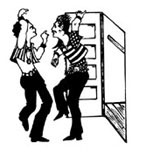
The Triumph of the 1960s In Quebec (of All Places!)
CATHOLICISM REPUDIATED
Though I was a bit surprised to discover recently that an American professor of British imperial history with whom I was speaking thought that Quebec City was the capital of Canada, I gave up wondering at Americans’ ignorance of their national neighbor to the north a long time ago. But for many Canadians the typical American’s unfamiliarity with Canada sticks in the craw. During the Canadian Prime Minister’s visit to Washington in April 1997, the Canadian Broadcasting Corporation went into low-key mourning over that very thing. Apparently Senate Leader Trent Lott mispronounced Jean Chrétien’s name at a public event. “We’re delighted to have Prime Minister Krestian with us today,” or some such. This sort of thing is nothing new, of course. Poor Prime Minister Diefenbaker seems to have been called everything from Diefenbooger to Studebaker, and in the 1980s Brian Mulroney was heralded in the U.S. capital as Prime Minister Muldoon. At least Senator Lott was close. Well, kinda. And by the way, what is the capital of Canada?
Of course, if most Americans gave any thought at all to Canadians’ complaints, they would probably reply the way one undergraduate in California did when I posed this question to him: “How many provinces are there in Canada?” Response: “Who cares?” Well….
According to a recent article by David T. Jones in The Washington Quarterly (Spring 1997), Americans shouldn’t fret if Quebec secedes from Canada. “Although it is clear that a united Canada is in the U.S. interest,” Jones writes, “it is equally clear that the United States could live with a disunited Canada.” In Jones’s view, Quebec could surely stand on its own as an independent nation: “Such a state would be a nation of seven million with substantial natural resources and energy supplies. It would have a well-educated, energetic population with sophisticated economic and fiscal systems, one that is export-oriented and comfortable with advanced technology. It would be the United States’ fifth- or sixth-largest trading partner.” So, according to Jones, who served at the U.S. Embassy in Ottawa from 1992 to 1996, an independent Quebec could surely carve out a relatively comfortable place for itself among the nations. (Ottawa, by the way, is Canada’s capital city.)
Written after Quebec’s referendum on sovereignty in October 1995 failed by less than one percent of the vote, Jones’s paper is interesting for reasons beyond itself — not the least of which is the hullabaloo it raised in political and diplomatic circles in the U.S. and in the media in Canada.
You May Also Enjoy
Black Elk repeatedly spoke of how the Lakota ways were "connected" to Catholicism, and how the spiritual experiences of the Lakota prepared them for Christ.
Has the NCR become the village atheist?
Marquette U. theologian Daniel McGuire's "faith" didn't stick to his son.

